Latino voters in this Pa. town worry about Trump's immigration policies -- but aren't ready to reject him
Published in News & Features
HAZLETON, Pa. — Nicolas Diaz looked out at the empty sidewalks along Wyoming Street, one of this former coal region’s main commercial corridors, and took it as proof that the president he supported is delivering on promises to keep his city safe.
Diaz, a 78-year-old retiree originally from the Dominican Republic, voted for President Donald Trump last year. He blamed Democrats for open borders that he thinks led to crime, including in the city he has called home for a decade, where he said an influx of undocumented people took jobs that should have gone to local residents and U.S. citizens.
“They’re not coming anymore,” Diaz said from beneath the cover of a storefront awning on a recent drizzly afternoon. “The ones that are here are in hiding.”
As Diaz defended Trump’s policies as making his community safer, his friend Robin Rubin interjected. “Right now, there are parents who are afraid to go drop off their kids at school,” Rubin, 77, challenged him. “No matter what other people say, that’s not good.”
Hazleton is the only one of Pennsylvania’s three largest majority-Latino cities to vote for Trump. The others, Reading and Allentown, supported him with about 35% of the vote.
Seven months into Trump’s administration, residents in Hazleton are grappling with their decision. In interviews with a dozen people here in English and Spanish, residents overwhelmingly said they object to the deportation or arrests of hardworking, noncriminal, undocumented immigrants, though they have yet to see much aggressive enforcement in their hometown.
But many Latino Trump supporters in the Luzerne County community said despite their misgivings about immigration policy, they still largely stand by the president.
National polling shows Latinos, who supported Republicans at record levels in the 2024 presidential election, have started drifting away from Trump and the Republican Party. But in Hazleton, a city with a history of anti-immigration policies and 30 years of local Republican leadership, it’s not evident that the political winds are changing. And despite the critical midterm elections next year, neither party has much of a presence in the city’s neighborhoods.
Guillermo Lara, a Democrat who lived in Hazleton for 20 years and now sits on the Governor’s Advisory Commission on Latino Affairs, said frustration with Trump’s immigration policies has been building but people are wary of speaking against the party in power — and many have yet to be affected directly.
“A lot of people, they’re quiet. Some of them tell me they made a mistake. They are not really happy about immigration. But a lot of people, they say, ‘It’s gonna get better,’ because they know they made a mistake and there’s nothing they can do now.”
Lara thinks both parties are failing to engage with Latinos, a key constituency.
“Republicans are winning but they’re not winning — look at Donald Trump, he’s not doing anything good with immigration. And Democrats, to me, it’s just the same, they’re not doing anything different,” he said.
Hazleton’s anti-immigrant past
Since Trump took office in January, U.S. Immigration and Customs Enforcement arrests have surged around the state, largely targeting noncriminals. Immigration raids at workplaces in Philadelphia and Norristown have had a chilling effect across immigrant communities.
Hazleton, a city of nearly 30,000 situated about 28 miles outside Wilkes-Barre, has not experienced the headline-grabbing ICE enforcement tactics raising fear in other cities. That has tempered the frustration of some residents who disagree with Trump’s policies overall.
“Here, it’s not too much,” said Angie Chapman, a longtime Trump supporter in Hazleton. “There’s not a lot of bad people here. Some people seem nervous, but I tell them don’t be nervous because it’s not like social media says.”
Chapman, a local tax preparer who works with immigrants, has been a Republican and a Trump supporter since 2016. Her sons work for Republican lawmakers in the city. She doesn’t see an erosion of support here for Trump, who she said connected in recent elections particularly with Dominican Americans as he emphasized patriotism, increased border security, and family values.
Trump won every ward last year in Hazleton, a city that is 63% Hispanic, according to the most recent census data, and where about 37% of residents are foreign-born. He won 61% of the vote in the city — a seven-percentage-point gain from his win there in 2020 and an even larger margin than in Luzerne County as a whole, where Trump won last year with 59% of the vote.
Hazleton, formerly part of Northeast Pennsylvania’s historic coal-producing region, was already more conservative than some Latino enclaves in the Lehigh Valley or Philadelphia. It’s where former Mayor Lou Barletta, following an influx of Latino immigrants in the early 2000s, tried to pass harsh anti-immigration ordinances that aimed to fine landlords who rented to undocumented immigrants and to require employers to verify a worker’s legal status before hiring.
While a court overturned the local law in 2007, Barletta’s efforts made national news and laid the groundwork for Trump to campaign in the city on border security and fairer immigration practices.
Chapman thinks Trump’s immigration enforcement policies have made some processes, like helping her clients work through citizenship, move quicker. She dismisses reports of indiscriminate ICE action as overblown by the media.
Elsewhere, advocates and attorneys report immigration court cases are backed up, and fears are heightened even as people move through the process legally with routine matters.
“Everybody understands that it is a threat to all of us,” said Omar De La Cruz, an organizer based in Hazleton with the immigrant advocacy group Make the Road PA. “Even people that believe … maybe they wouldn’t be affected, they are realizing that is not really the case.”
De La Cruz described several incidents in Hazleton in which he said undocumented people were arrested by ICE on site before or after appearing in court.
“I do think that the minds will change, and they are changing. … They thought they had protection and are realizing that is not the case.”
‘They’re being sent back … with nothing’
The bright honeycomb-patterned ceiling lights were on in Cristian Guillen de Jesus’ barbershop late last month, but not a single customer was inside.
Guillen de Jesus, 43, attributed the empty chairs in the once-bustling shop to Trump’s immigration policies. He has noticed fewer people around town and suspected many of the undocumented immigrants in Hazleton have gone into hiding or left.
At the same time, Guillen de Jesus, a legal resident who as a non-U.S. citizen cannot vote, said he agrees with changes Trump has made to the economy and the immigration system.
“I was one of the people who wanted Trump back,” he said. Like other people in Hazleton, he described frustration in navigating a potential pathway to citizenship the “right way,” while so many people crossed the border illegally and received immediate government support. His wife brought him to the United States from the Dominican Republic in 2014 and he waited approximately three years to get his residency sorted out. He is considering applying for citizenship this year, confident the system will work out in his favor.
“I think that no matter how harsh immigration law is in this country, the government will take into account and consider any immigrant that comes to this country, comes to work, comes to do the right thing, and subjects themselves to the laws of this country,” he said.
And he hopes to see more economic payoff from Trump’s election in the coming year.
“We hope that everything goes back to normal so the people can move forward,” he said.
Even fervent supporters of Trump admit they are wrestling with headlines about ICE deporting noncriminals.
Alexandra Mendez, a 48-year-old single mom who owns a small business selling household decor, thinks news of raids and deportations have stunted the economy somewhat in Hazleton, which had been reenergized by Latino businesses in recent years.
“When this all began, the streets looked empty,” she said. “It looked the way it did during COVID.”
Mendez, who came to the U.S. in 2006 from the Dominican Republic and became a citizen in 2015, said she has aligned with Trump since he first entered politics. She appreciated his promises to deport undocumented people who were committing crimes and making neighborhoods unsafe.
Still, as she dropped her youngest off at college recently, it drove home her belief that the United States should be a place where all people can make something of themselves. She struggles to reconcile that with hardworking immigrants being swept up in raids.
“Some people are being punished without deserving it and being separated from their families,” she said. “They’re being sent back to their country with nothing.”
She doesn’t blame Trump. Rather, Mendez thinks overzealous people in his administration and in immigration enforcement are leading the charge. She said she still believes Trump wants to target only criminals, despite his administration’s broad enforcement.
A’s and B’s for Trump
As he knocks on doors in his campaign for Hazleton City Council, Democrat David Dominguez often asks voters what letter grade they would give Trump. Dominguez, who teaches English as a second language, hears a lot of A’s and B’s in response. Even voters who said they didn’t vote for Trump rarely grade him lower than a C, he said.
Dominguez attributes some of that to fear about speaking out that could be masking real anger with Trump and the Republican Party. He said he is hopeful the midterms will be a referendum on Trump’s administration.
But he thinks it’s also the failure of his own party at the state and national levels to capitalize on the moment and engage with the Latino voters they have lost. Dominguez, who is also chair of the city’s Democratic Party, is deeply frustrated with his own party’s absence in Hazleton.
“Optimism is good, but there’s got to be action,” he said. “There’s got to be civic engagement. There’s got to be follow-up. I can’t be the only one doing everything.”
Republicans are not exactly blanketing Hazleton to reach voters, either, which some GOP strategists have warned could become a problem if the party wants to hold on to gains it made with Trump at the top of the ballot last year.
“You can’t take the risk of someone taking a vote and then it’s radio silence,” said Albert Eisenberg, a Republican GOP strategist who started PA Republicanos, a PAC dedicated to Latino outreach. The PAC is holding voter registration drives in Hazleton and Northeast Philadelphia this month.
“The real risk for Republicans is we haven’t shown what ‘promises made, promises kept’ means in words that resonate,” he said.
Eisenberg called Trump’s slumping approval rating an alarm bell for his party ahead of the 2026 midterms, when Democrats are targeting four Republican seats in Pennsylvania, including that of U.S. Rep. Rob Bresnahan of Luzerne County, a freshman who narrowly won the district that includes Hazleton.
As Dominguez, the city council candidate, went door to door, he didn’t mention he’s a Democrat. Instead, he talked with neighbors about local issues — road repairs, getting more parks for kids and more grant money for the city’s businesses.
About half an hour into Dominguez’s canvass on a rainy day last month, Virgilio Tavarez, a 57-year-old construction worker, invited him inside to chat. Tavarez, who moved to Hazleton from New York City five years ago, had a perspective that sounded familiar.
Tavarez largely supports Trump’s immigration policies, which he thinks help deter criminals and people looking for handouts. He feels bad about families being separated as a result of raids and deportations, but is ultimately swayed by what he thinks is a legitimate need for “law and order.”
Tavarez went through the legal channels to get here from the Dominican Republic and he thinks other people should, too, he told Dominguez.
“Everyone should have their papers,” he said.
Dominguez thanked him for his time and moved onto the next house.
“There’s Dominicans and Hispanics who regret voting for Trump,” Dominguez said. “But the other half say, hey, look at Hazleton. We don’t have ICE raids, it’s business as usual, and that’s what they use to justify saying, ‘It’s not that bad.’”
_____
(Staff writer Dylan Purcell contributed to this article.)
_____
©2025 The Philadelphia Inquirer. Visit inquirer.com. Distributed by Tribune Content Agency, LLC.
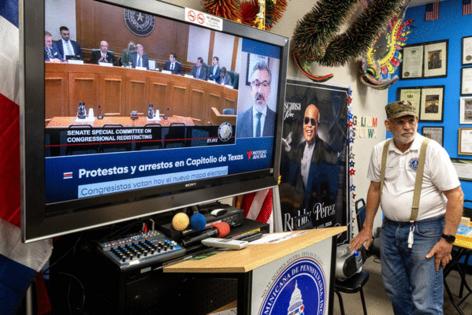
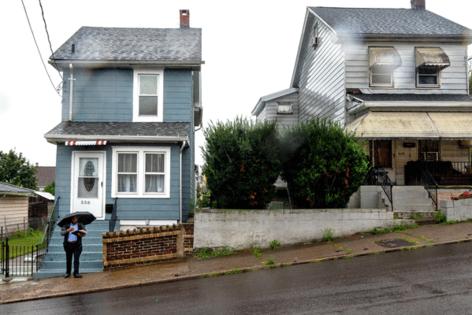
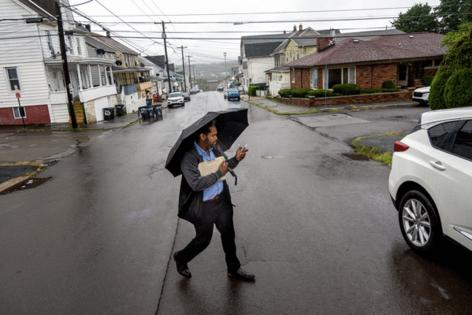
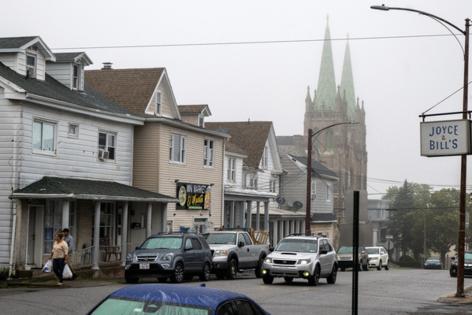
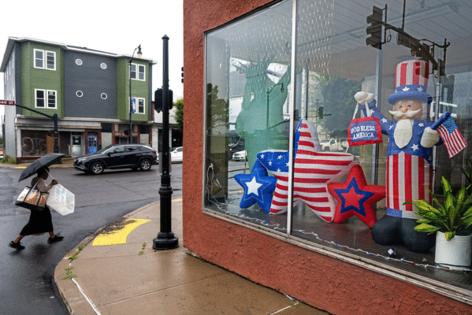











Comments